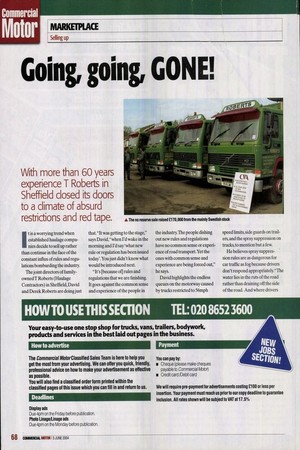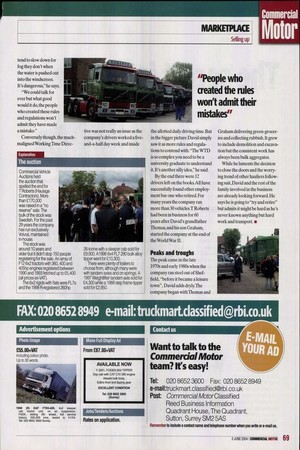Going, going, GONE!
Page 67

Page 69

If you've noticed an error in this article please click here to report it so we can fix it.
With more than 60 years experience T Roberts in Sheffield closed its doors to a climate of absurd
restrictions and red tape.
It is a worrying trend when established haulage companies decide to sell up rather than continue in the face of the constant influx of rules and regulations bombarding the industry.
It is a worrying trend when established haulage companies decide to sell up rather than continue in the face of the constant influx of rules and regulations bombarding the industry.
It is a worrying trend when established haulage companies decide to sell up rather than continue in the face of the constant influx of rules and regulations bombarding the industry. The joint directors of familyowned T Roberts (Haulage Contractors) in Sheffield, David and Derek Roberts are doing just
that."It was getting to the stage," says David,"when I'd wake in the morning and I'd say 'what new rule or regulation has been issued today'.You just didn't know what would be introduced next. "It's [because of] rules and regulations that we are finishing. It goes against the common sense and experience of the people in
the industry.The people dishing out new rules and regulations have no common sense or experience of road transport.Yet the ones with common sense and experience are being forced out," he says. David highlights the endless queues on the motorway caused by trucks restricted to 56mph
speed limits, side guards on trailers, and the spray suppression on trucks, to mention but a few. He believes spray suppression rules are as dangerous for car traffic as fog because drivers don't respond appropriately. "The water lies in the ruts of the road rather than draining off the side of the road. And where drivers
tend to slow down for fog they don't when the water is pushed out into the windscreen. It's dangerous," he says.
"We could talk for ever but what good would it do, the people who created these rules and regulations won't admit they have made a mistake." Conversely though, the muchmaligned WorkingTime Direc tive was not really an issue as the company's drivers worked a fiveand-a-half day week and inside
the allotted daily driving time. But in the bigger picture David simply saw it as more rules and regulations to contend with."The WTD is so complex you need to be a university graduate to understand it. It's another silly idea," he said.
By the end there were 12 drivers left on the books. All have successfully found other employment bar one who retired. For many years the company ran more than 30 vehicles.T Roberts had been in business for 60 years after David's grandfather Thomas, and his son Graham, started the company at the end of the World War II.
Peaks and troughs
The peak came in the late 1970s and early 1980s when the company ran steel out of Sheffield, "before it became a leisure town", David adds dryly. The company began with Thomas and
Graham delivering green-groceries and collecting rubbish. It grew to include demolition and excavation but the consistent work has always been bulk aggregates. While he laments the decision to close the doors and the worrying trend of other hauliers following suit, David and the rest of the family involved in the business are already looking forward. He says he is going to "try and retire" but admits it might be hard as he's never known anything but hard work and transport. •
































































































































































































